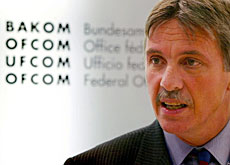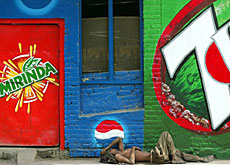Summit leaders split over bridging digital divide

The government says progress is being made in negotiations ahead of the World Summit on the Information Society (WSIS), opening in Geneva in two weeks.
But the head of the Federal Communications Office, Marc Furrer, told swissinfo that the key issue of funding was unlikely to be resolved before or during the summit.
In the run-up to the meeting, Switzerland has been charged with acting as an informal mediator during last-ditch talks with individual countries, aimed at ironing out lingering differences over the draft declaration and plan of action.
Despite several rounds of preparatory meetings, deep divisions remain over issues like freedom of expression, internet security and the financing of information and communication infrastructures in poor countries.
The aim of the WSIS is to reduce the digital divide by ensuring access for everyone to information and communication technologies.
swissinfo: With just two weeks to go before the summit, how are the behind-the-scenes negotiations going?
Marc Furrer: It’s a good atmosphere. People are willing to find compromises… but it’s not easy.
What was the outcome of President Couchepin’s discussions last week in China about its opposition to references in the summit draft declaration about freedom of expression?
M.F.: That was an important point of his visit. China’s position in this summit process was also discussed and I’m optimistic that we will find a way with China.
We would like to see the Universal Declaration of Human Rights incorporated into the summit declaration, which would be logical. But the question now is what wording will be used and we have to sort that out. It’s still a difficult obstacle to overcome but certainly Couchepin’s visit to China helped.
Has there been any progress on the sticking point of Russia’s insistence that internet security must be linked to military issues?
These talks are ongoing and I wouldn’t want to [say anything] that could jeopardise the whole thing. So we have to be discreet, but generally the atmosphere is good and people want to see a good outcome.
Switzerland will be conducting negotiations on the question of financing, including the creation of a voluntary digital solidarity fund – an idea backed by developing countries but opposed by industrialised nations. What’s your position on this?
Switzerland’s role in this is as a neutral facilitator so we have to find a solution that all 191 countries can agree on.
I believe that we have to find ways of financing these new infrastructures in developing countries, especially in the poorest countries. We have to find a [financing] mechanism and whether that’s a fund or something else, we should really examine it after Geneva and then come out with something.
So you expect to see some of these key issues pushed back to the second phase of the summit in Tunisia in 2005?
It’s not really pushing them back… Geneva is the beginning of a process about the information society. So it would have been rather naïve to think that we would come up with solutions for all of the questions. It doesn’t work like that.
In terms of this summit, we have to have unanimity and that’s the main problem. I believe the issue of financing will have to be carefully examined over the next few months and years.
Civil society representatives recently expressed frustration over the process, saying they would come up with their own vision for the information society. Where do things stand on this?
For us it’s important that the civil society and the private sector are integrated in the whole process and that they stay in the process. I understand that they want to have their own vision but what they contributed on a lot of issues has already been integrated into the [official] papers.
But not everything was [integrated], so they have a right to come up with their own declaration. That’s not a problem.
swissinfo-interview: Anna Nelson
The WSIS will be held in two phases, with the first round of talks taking place in Geneva on December 10-12 and the second round in Tunisia in 2005.
The summit aims to come up with an action plan to bridge the digital divide and to resolve international divisions over issues like internet security and governance.
As president of the summit host country, Pascal Couchepin, will open the discussions, which will be attended by the United Nations secretary-general, Kofi Annan, and around 8,000 representatives of government, civil society and the private sector.
The communications minister, Moritz Leuenberger, will head up the Swiss delegation, which will also include the foreign minister, Micheline Calmy-Rey.

In compliance with the JTI standards
More: SWI swissinfo.ch certified by the Journalism Trust Initiative

You can find an overview of ongoing debates with our journalists here . Please join us!
If you want to start a conversation about a topic raised in this article or want to report factual errors, email us at english@swissinfo.ch.